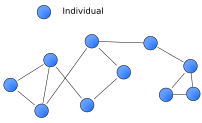Bursty science depends on openness:
[Via Science in the open]
 Image via Wikipedia
Image via Wikipedia
There have been a number of interesting discussions going on in the blogosphere recently about radically different ways of practising science. Pawel Szczesny has blogged about his plans for freelancing science as a way of moving out of the rigid career structure that drives conventional academic science. Deepak Singh has blogged a number of times about ‘bursty science‘, the idea that projects can be rapidly executed by distributing them amongst a number of people, each with the capacity to undertake a small part of the project.
[More]
There will be many of these little experiments – using online conversations for scientific endeavors. Even inside an organization, having an online area to ask for help can be useful. Trying to use email for this purpose has little effect.
There are several ways to use Web 2.0 approaches to ask/answer questions. An online forum works well if it is substantially populated and active. A forum with a 3 month old unanswered question will not be very useful.
One approach that works is to have one person, or a small group, act as troubleshooters. They probably already exist in many organizations. They are the ones every one goes to when they have a problem in the lab.
They usually have a wide range of knowledge and often work to help people find a solutions to a research problem.
Have these people move online. A troubleshooting page on a wiki would allow questions to be asked. The troubleshooters have the opportunity to find answers. FAQs could be written to respond to the endless questions many troubleshooters receive.
Then when someone asks for some help, there is already a team with responsibility to find answers. And, because all this is open and transparent, the troubleshooters can finally get the well deserved credit they should.
Helping in the lab is generally invisible to others, particularly when evaluation time comes around. It is hard to document just what the help accomplished.
A troubleshooting wiki, on the other hand, would provide ample documentation on just what help was provided and the effect that help had on the organization. The ability to actually document who helps the organization move forward will be very valuable.